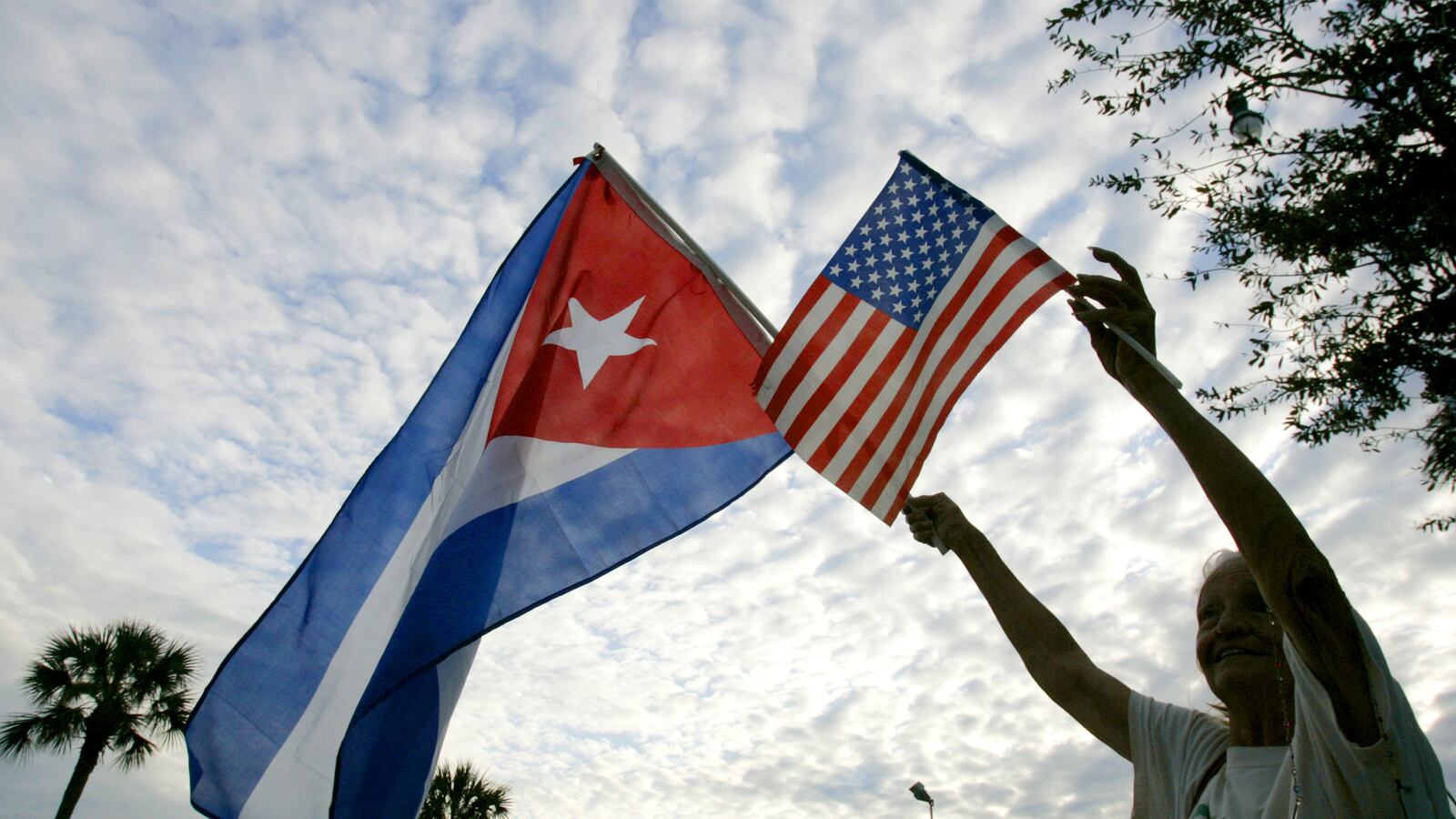So how is Cuba playing out politically?
That was the first question to pollsters Ed Goeas and Celinda Lake, whose Battleground survey regularly tests voter attitudes in key states. They had come armed with a mass of data on the last election and a good sense of what’s ahead for 2016 (hint: it’s the economy, stupid).
But they weren’t fully prepared on Cuba. It was the morning after President Obama’s surprise announcement on normalizing diplomatic ties, and there were no numbers to bolster their views. First they laughed that embarrassed laughter that comes when you’re caught flat-footed. Then they hesitated, each waiting for the other to speak. Finally Goeas, the Republican, plunged ahead.
He thinks Obama blundered. His theory, based on the history of second term White Houses, is that once the re-elect is over, the political people head for the exits and the policy people, who had been playing second fiddle, are in charge. And in his view, they may be good at policy but have “a deaf ear when it comes to politics.”
The message from the midterm election is that the American public wants Congress and the president to work together, Goeas said, and Obama’s unilateral actions—first on immigration and now on Cuba—are partisan legislative maneuvers and evidence of “a tin ear.”
It’s tempting to say Lake, the Democratic pollster, was “all ears.” “Thank you for speaking first,” she said. She pointed out that the administration’s new policy was “a year in the making,” that initial soundings suggest the public is “broadly in favor,” there’s a division in the Cuban community between older émigrés and younger people, “and it’s about time,” she concluded, quickly pivoting to why she was having breakfast with reporters on Thursday.
“Where is our economic message?” she asked rhetorically. “That’s what matters,” not Cuba policy. “Most people are focused on the holidays anyway,” she continued, before adding something about people liking Cuban sandwiches.
Truth is, no one is sure how Cuba will play in the critical swing state of Florida in 2016. Hillary Clinton supports Obama’s policy; Jeb Bush opposes it, as does the rest of the GOP field with the exception of Senator Rand Paul, who said on talk radio that opening up Cuba is “probably a good idea.”
And with that remark from Paul, former Florida Governor Bush, who just a few days earlier announced he would “actively explore” a presidential run, found himself in an intra-party fight he didn’t anticipate.
“I’m sure [Bush] would prefer to have his comments and next steps on a high plane, that’s the tone he’s trying to set,” former Clinton chief of staff Mack McLarty told the Daily Beast. McLarty’s firm does business in Latin America, and he has worked with Bush, whom he likes and respects. “Like Mike Tyson says, you have a great fight plan until you come out and take the first punch.”
How much Cuba and by implication Florida will shape 2016 is debatable, but Lake said there was one thing she would predict: “Tell me who is ahead on the economy the day before the election, and I’ll tell you who will be president.”
Her message to Democrats: “it’s the economy, we must have a bigger message.” Despite improving job numbers and the longest streak, 57 months straight, of private-sector job creation, the American people see the economy as getting worse (31 percent) or as poor and staying the same (25 percent). Less than a third say it’s getting better (30 percent) and only 11 percent say it is good.
The really damning number is the 73 percent of self-identified middle-class voters who say their kids are not going to be better off economically. Lake called the pessimism about the future of the next generation “a fundamental violation of what this country is about.”
A reporter asked if Hillary Clinton could connect with these voters given her association with Goldman Sachs and “the parade of SUVs that accompany her when she goes to Iowa and New Hampshire.” Lake said she appreciated what the reporter was suggesting about Clinton’s vulnerabilities and the power of Elizabeth Warren’s populist message.
But for all the hoopla around Warren, in primary matchups, polling shows Clinton winning 65 to 12 “against a person who isn’t even running,” Lake said. “I don’t see any reason why she can’t get those Warren Democrats.” Their policies will be similar—standing up for the little guy—though their style is very different.
“Clinton will run more like a governor,” Lake said. “Governors don’t bash anybody. They get it done.”
Warren has said repeatedly she’s not running for president, which Lake underscored. But Goeas appeared to relish the prospect of Warren in the mix as an opportunity to replay the statement first made by her that “You didn’t build that”—that any individual’s success in business relies on government services and support. “Elizabeth Warren is the originator,” he said of the comment that energized Republicans in the 2012 race.
By the time voters go to the polls in 2016, Cuba policy may be a boutique issue, central to some voters in Florida but not decisive nationally. This end-of-year sounding of voter attitudes in the battleground states finds an electorate that is glum about the future and skeptical government can make a difference. For the right politician, and the right message, it’s an opportunity to bring people together. “People are extremely anxious about the next generation,” Lake said, “and it unites America.”






